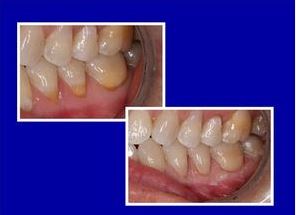Abfraction lesions are small notches caused by stress (forces) on your teeth. Biting, chewing, clenching and grinding put pressure on your teeth. Over time, this pressure can cause cracks and splits in the outer layer of your teeth. This occurs in the thinnest part of your enamel, near the gumline. Grinding your teeth puts pressure on them over and over. For this reason, people who grind their teeth are more likely to get abfraction lesions.
Abfraction lesions are fairly common in adults. Older adults are especially likely to have them. They occur more often in the back teeth, called premolars and molars. But they can occur in the front teeth as well. They appear as crescent-shaped or wedge-shaped notches near the gumline.
Teeth with abfraction lesions are not more likely to decay, but they can get weaker over time. Weak teeth may be more likely to break.
Abfraction lesions don’t usually hurt. They affect the enamel, the outer layer of the tooth. In severe cases, the dentin and cementum layers of a tooth may become involved. Dentin is the layer below the enamel. Cementum covers the tooth root instead of enamel. Dentin may be exposed if a crack develops. In these cases, the tooth may become sensitive. Otherwise, the lesions do not cause symptoms. Dr. Koshki can see abfraction lesions during a regular dental exam. Abfraction lesions do not heal over time.
Abfraction lesions are caused by the uneven forces produced when you bite or grind your teeth. Therefore, you usually can’t prevent them. If you grind or clench your teeth, you can wear a night guard to reduce the pressure on your teeth.
Dr. Koshki can treat abfraction lesions by filling them. The process is often like filling a cavity. In other cases, the tooth does not need to be drilled first. The material also is similar to a tooth filling. Dr. Koshki always uses tooth colored filling material to treat abfraction fillings.
If you notice notching or wear on your teeth near the gums, you do not need to call Dr. Koshki right away. You can point them out at your next visit. You may want to come in sooner if the lesions are causing tooth sensitivity. Using special gels or pastes recommended by our office may also reduce sensitivity issues caused by abfractions.
Note: An abfraction lesion is not the same as a cracked tooth. A cracked tooth is much more serious. Deep cracks are likely to affect the inside of the tooth, the pulp. These cracks are painful. These teeth need to be treated right away.
Always feel free to ask Dr. Koshki about any concerns that you might have regarding abfractions or any other oral health issue.








